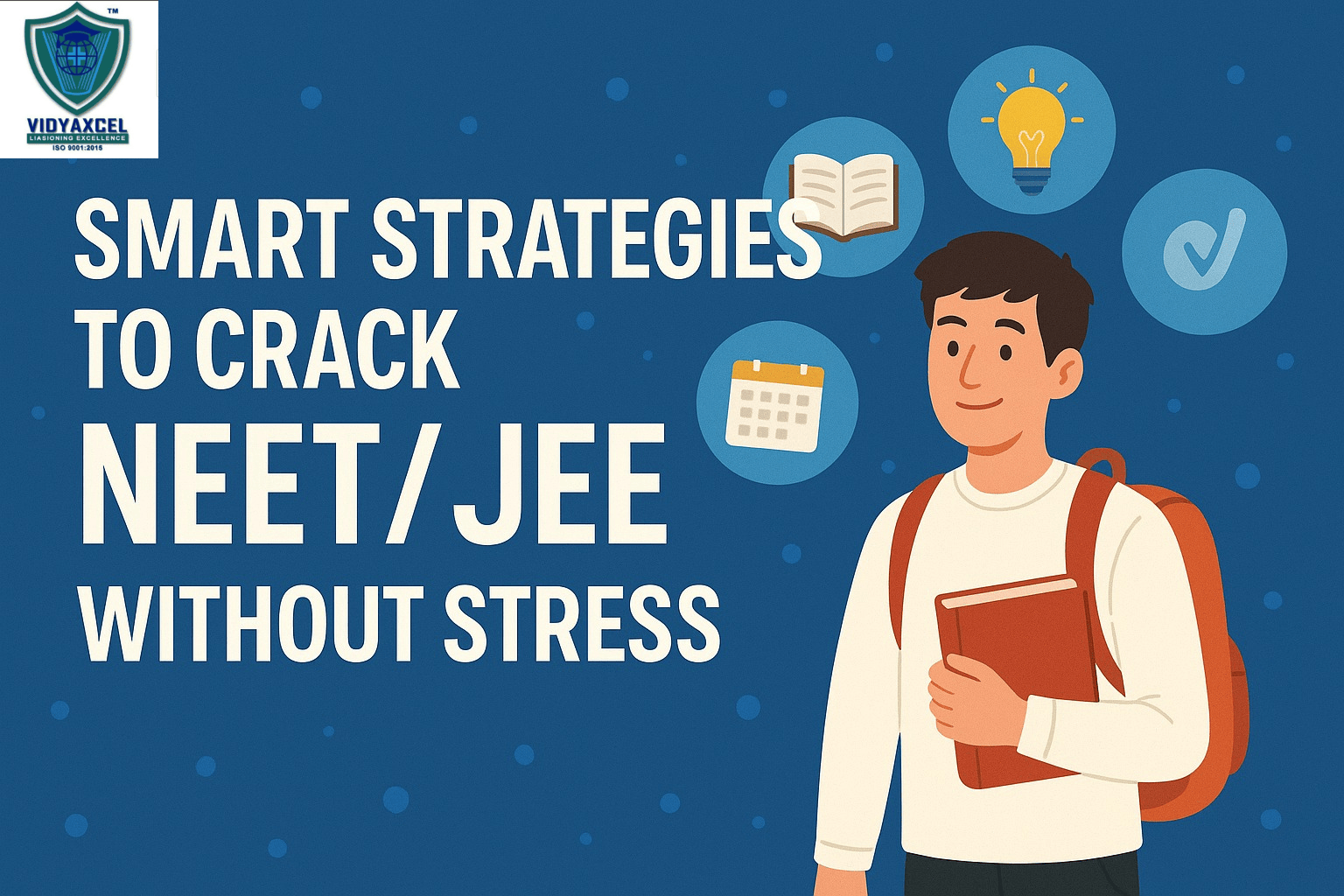Blog Details

12Jul
Smart Strategies to Crack NEET/JEE Without Stress
Cracking competitive exams like NEET and JEE is often perceived as a high-stakes, high-pressure journey. With lakhs of students appearing each year and limited seats in top institutions, the pressure can be overwhelming. However, success doesn’t have to come at the cost of mental health and well-being. The key lies in adopting smart strategies—methods that combine productivity, planning, and mental wellness.
1. Understanding the Syllabus Deeply
Why It Matters: A deep understanding of the syllabus helps avoid wasting time on irrelevant topics and focus on high-weightage areas.
Strategy:
-
Go through official syllabi provided by NTA (NEET) and NTA/NTA-approved websites (JEE).
-
Highlight overlapping concepts with your Class 11 and 12 syllabus.
-
Make a priority list of chapters based on weightage and difficulty.
2. Create a Realistic Timetable
Why It Matters: A personalized, achievable timetable gives you direction and prevents burnout.
Strategy:
-
Divide your day into 3 segments: Concept Learning, Practice, and Revision.
-
Incorporate short breaks after every 90 minutes of study.
-
Set weekly and monthly goals instead of daily overloading.
-
Allocate time for hobbies and family to keep stress levels low.
3. Focus on Conceptual Clarity Over Rote Learning
Why It Matters: Competitive exams test understanding, not memorization.
Strategy:
-
Use NCERT as your base.
-
Watch concept videos from reliable platforms (Physics Wallah, Khan Academy, Unacademy).
-
Practice ‘teach-back’—explain the concept to someone else or to yourself.
4. Smart Note-Making and Revision Techniques
Why It Matters: Revision without proper notes is chaotic and inefficient.
Strategy:
-
Create concise notes using flowcharts, diagrams, and mnemonics.
-
Use sticky notes or digital tools like Notion or OneNote.
-
Schedule weekly revision slots and monthly full-topic reviews.
5. Use the Pomodoro Technique for Focused Study
Why It Matters: Pomodoro boosts focus while allowing for mental rejuvenation.
Strategy:
-
Study for 25 minutes, take a 5-minute break (1 Pomodoro cycle).
-
After 4 cycles, take a 30-minute break.
-
Use apps like Focus Booster or Forest to stick to this technique.
6. Practice with Purpose
Why It Matters: Practicing randomly can lead to overconfidence or underconfidence.
Strategy:
-
Practice 30–50 MCQs daily on previously studied topics.
-
Maintain an error journal: record mistakes and revisit them weekly.
-
Solve previous years' question papers and mock tests in timed settings.
7. Mock Tests and Analysis
Why It Matters: Simulated testing prepares you for real-exam pressure and identifies weak areas.
Strategy:
-
Attempt one full mock test every two weeks, increase frequency closer to exams.
-
Analyze your performance, not just the score.
-
Focus on accuracy and time management.
8. Leverage Quality Online Resources
Why It Matters: Smart use of technology makes learning accessible and engaging.
Strategy:
-
Use platforms like NEETprep, Embibe, Vedantu, Aakash BYJU’S, NTA Abhyas App.
-
Watch short concept revision videos during breaks.
-
Use digital flashcards for quick revisions.
9. Balanced Diet and Exercise
Why It Matters: Physical health directly affects concentration, energy levels, and stress.
Strategy:
-
Eat a balanced diet: protein, complex carbs, and hydration.
-
Avoid junk and excessive caffeine.
-
Include at least 30 minutes of physical activity daily—walking, yoga, or stretching.
10. Sleep Hygiene and Rest
Why It Matters: Sleep affects memory consolidation and cognitive performance.
Strategy:
-
Maintain a regular sleep schedule—7–8 hours/night.
-
Avoid screens 1 hour before bedtime.
-
Use breathing exercises to calm the mind before sleep.
11. Mental Health and Positive Affirmations
Why It Matters: Stress, anxiety, and comparison can derail preparation.
Strategy:
-
Practice mindfulness, journaling, or meditation.
-
Surround yourself with positive influences.
-
Avoid toxic comparison with peers—focus on progress, not perfection.
12. Peer Discussions and Group Study (in Moderation)
Why It Matters: Group study helps reinforce understanding but should be managed.
Strategy:
-
Choose 1–2 like-minded peers.
-
Set specific goals before starting a group session.
-
Don’t let group study replace solo focus time.
13. Seek Expert Guidance When Needed
Why It Matters: Guidance from mentors can clarify doubts quickly and help adjust strategy.
Strategy:
-
Join a coaching institute if self-study is overwhelming.
-
Ask doubts on online forums or apps like Doubtnut.
-
Attend webinars or masterclasses for exam strategy updates.
14. Stay Motivated with Vision Boards or Goal Trackers
Why It Matters: Visual reminders keep long-term goals in focus.
Strategy:
-
Create a vision board with college goals, inspirational quotes, and personal rewards.
-
Use apps like Habitica or Todoist to gamify tracking.
-
Celebrate small wins like completing chapters or clearing mocks.
15. Avoiding Information Overload
Why It Matters: Too many resources can confuse rather than help.
Strategy:
-
Stick to 1–2 trusted textbooks and platforms.
-
Don’t switch resources frequently.
-
Revise from your own notes and avoid “fear of missing out.”
Conclusion
Cracking NEET or JEE is not just about hard work—it's about smart work. When you study with intention, maintain balance, and focus on both your academics and mental health, success becomes a natural outcome. Use the strategies outlined here to transform stress into structured preparation. Remember, it’s not a sprint—it’s a marathon. Progress, not perfection, is the key.
FAQ's
Q1: Can I crack NEET/JEE without coaching?
A: Yes, many students have cracked these exams through self-study using online resources, disciplined schedules, and smart strategies.
Q2: How many hours should I study daily for NEET/JEE?
A: Quality matters more than quantity. Aim for 6–8 focused hours with breaks, but ensure deep understanding and revision.
Q3: Is group study effective for NEET/JEE prep?
A: It can be if done with disciplined peers and specific goals. Limit it to 1–2 times a week.
Q4: How to stay motivated during preparation?
A: Set small goals, use visual reminders like vision boards, take breaks, and stay connected with mentors and supportive friends.
Q5: What should I do if I feel overwhelmed or anxious?
A: Take a break, talk to someone you trust, practice deep breathing or mindfulness, and revisit your goals with a calm mind. Mental health is just as important as academics.
Our Office: West Bengal, Maharashtra & Delhi.
For More Infomation about admission in Medical, Engineering, Management & Study in Overseas Details.
View Current Study Overseas, Medical, Engineering & Management Admission Details Video.




